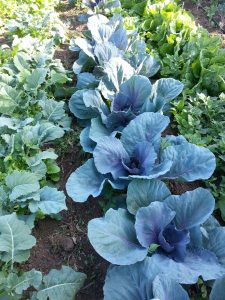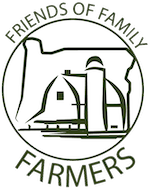In late 2015, the Food and Drug Administration (FDA) finalized the long-awaited Food Safety Modernization Act ‘Produce Rule,’ which sets sweeping new standards for growing, packing, harvesting and holding produce for human consumption.
 Friends of Family Farmers joined sustainable and family farm advocates from across the nation to submit comments and provide feedback on the proposed rules during comment periods in 2014 and in face-to-face meetings with FDA staff in 2015. Our message was clear: smaller farms either need to be exempt from onerous new requirements under the rules, or must be able to comply without facing unreasonable costs. The farmers we work with already strive to provide the highest quality, healthiest produce available, and any requirements in the new Produce Rule should be based in science and not put responsible farmers at risk of going out of business.
Friends of Family Farmers joined sustainable and family farm advocates from across the nation to submit comments and provide feedback on the proposed rules during comment periods in 2014 and in face-to-face meetings with FDA staff in 2015. Our message was clear: smaller farms either need to be exempt from onerous new requirements under the rules, or must be able to comply without facing unreasonable costs. The farmers we work with already strive to provide the highest quality, healthiest produce available, and any requirements in the new Produce Rule should be based in science and not put responsible farmers at risk of going out of business.
The Produce Rule is wide ranging, and covers the use of manure and compost on farms; water quality for both irrigation and produce washing; farmworker hygiene; and other possible causes of food-borne illness. While we and others raised many concerns during early comment periods, we did see areas of overall improvement in the final rules. For a detailed analysis of what’s in the final rule, check out the National Sustainable Agriculture Coalition’s blog post on the topic. Additionally, the Oregon State University Small Farms Program has put together a run down of key pieces of information in both the Produce Rule and the related ‘Preventative Controls’ rule, which applies to food processing facilities.
While the rules were finalized late last year, many provisions will take time to go into effect, and some farms are exempt all together. So, here’s some things you need to know in the near term:
When do the regulations go into effect? The earliest deadlines for compliance with the Produce Rule are in January 2018, and this deadline applies only to the very largest farms. For farms classified as ‘small businesses’ – meaning they gross less than $500,000 per year on a rolling three year average – compliance begins in January 2019. Additionally, farms of this size can secure a ‘qualified exemption’ if more than 50% of their sales are direct-to-consumer or to restaurants and retail establishments within the same state and not more than 275 miles from the farm. Compliance begins in January 2020 for farms that gross less than $250,000 per year from produce sales on a rolling three year average – these are ‘very small businesses’ as defined by FDA. Farms that gross under $25,000 per year are exempt completely. A full list of exemptions and ‘qualified exemptions’ from FDA, including what crops are covered, can be found here.
How do farms get prepared for compliance? FDA is still working out the finer points of how farms can comply with certain provisions, and will be working with the Oregon Department of Agriculture on many details. FDA or ODA will likely be putting out more information on compliance as it is developed, but in the meantime, FDA is asking for farmers to submit specific questions or suggestions to their FSMA ‘Technical Assistance Network’ here.
That sounds really vague, what can I be doing now? If you believe your farm qualifies as a ‘small business’, ‘very small business’, or may even be exempt, begin documenting that now and keep good records. The FDA is ultimately going to need you to show them documentation dating back to 2016 to demonstrate how the rule will affect you.
In Oregon, the Oregon Department of Agriculture Food Safety Division ultimately expects there to be ‘thousands’ of farms in the state that have never previously experienced the level of inspection that FSMA will bring. In addition to documenting gross income to assess how the rules apply, many farmers who irrigate will have to test water for pathogens and may have to add filtration systems if their water quality is compromised.
Through our involvement in the Oregon Department of Agriculture’s Food Safety Task Force, Friends of Family Farmers is in a unique position to help provide feedback to ODA on how they approach their responsibilities for FSMA inspections, enforcement, etc. If you have any questions you’d like us to convey to ODA, please email our Policy Director, Ivan Maluski ivan@friendsoffamilyfarmers.org or give us a call.
